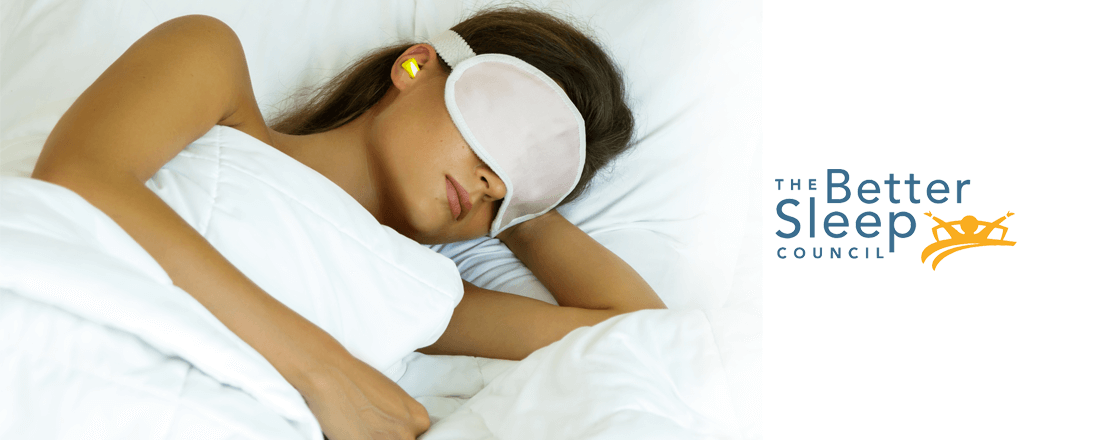
It’s long been known that the amount of sleep you get—or lack thereof—affects your mood and mental state. However, it’s important to note that your mood, such as anxiety, can affect the quality of your sleep. We spoke with Mary Helen Rogers, VP of marketing and communications with the Better Sleep Council, to learn more about their mission and the correlations between sleep and your quality of life.
The Better Sleep Council (BSC) is the consumer-facing, educational arm of the International Sleep Products Association, the trade association of the mattress industry. Their mission is to properly educate consumers on the relationship between sleep and health.
American’s Need Sleep Education

The BSC formed in 1978 when members of the International Sleep Products Association realized there was a need to help Americans better understand the impact of a good night’s sleep. Professionals from across the bedding industry came together and began publicizing and promoting information on how sleep affects everyone’s quality of life, while also emphasizing that a healthy and productive life starts with a quality mattress.
“We believe that the right mattress is the foundation for good health and is the most important piece of furniture in your home,” said Rogers. Every aspect of your life is impacted by the sleep you get or don’t get. This includes your health, happiness, appearance, weight, relationships and productivity.
BSC believes sleep is essential and if you aren’t sleeping right and on the right mattress, you aren’t living your best life. Rogers said the formula for a good night’s sleep is: you + a quality mattress = a good night’s sleep.
Poor Sleep Is Bad for Business
Poor sleep affects your mood just as much as a poor mood can affect the quality of your sleep. For example, anxiety, agitation, stress and arousal can all make it difficult to get a good night’s sleep. Alternatively, a lack of sleep can impact you emotionally and physically.
The health benefits of sufficient sleep are immeasurable, especially for the immune system. There’s nothing like the flu or other illness to set a business owner back. The benefits of adequate sleep will help business owners work more efficiently, with better focus, accuracy and judgment.
Sleep loss is also detrimental to executive functioning (memory, planning, organization and problem-solving). Insufficient sleep hampers our ability to handle stress, negatively impacts motivation and outlook and is linked to depression—none of which contributes to a successful business or work life.
According to a survey by the MetLife & U.S. Chamber of Commerce Small Business Index, survey respondents revealed they slept an average of 6.7 hours a night. Despite what you have heard, however, Rogers insists sufficient sleep does not preclude success.
“The quality of waking, working hours is more important than the quantity—because if we are sleep deprived, we are not functioning optimally, physically or psychologically,” she explained. Business owners should aim for the recommended 7 to 9 hours of sleep per night, even during peak seasons.
8 Tips for a Better Night’s Rest

When the inevitable happens—such as travel or late-night business meetings—you may have to get creative to ensure you are getting enough sleep to perform the best you can. A power nap is a great way to restore alertness and performance. A coffee nap is also helpful—a cup of coffee followed by a 20-minute nap.
Here are more tips from Rogers on how to improve the quality of your sleep:
- Schedule sleep like an appointment.
- Evaluate the comfort of your mattress. If it’s older than seven years, it may be time to replace.
- Set your alarm for the time you actually need to get up (no more hitting the snooze button).
- Finish eating 2-3 hours before bed so your system is ready to relax. Alcohol should be consumed early evening and caffeine should be consumed in the morning only.
- Try to complete exercise at least two hours before bed. Yoga before bed actually helps to relax the muscles and de-stress the mind.
- Take more naps. Short naps of 10 to 30 minutes can help you gain extra energy during the day and they won’t disrupt your sleep.
- Make adjustments to your bedroom so that it is dark, quiet, cool and cozy.
- Keep electronics out of the bedroom so there are no “blue lights.”
The Better Bed Quizzz
The Better Sleep Council created an online quiz—cleverly called the Better Bed Quizzz—that lets consumers answer some questions through a digital, self-evaluation tool to identify physical and lifestyle needs related to sleep.
Consumers are often unsure of what to look for in a mattress, especially since it’s an infrequent purchase and a significant investment. The BSC Better Bed Quizzz is designed to alleviate confusion from the mattress buying process. Questions cover things like your current mattress type, mattress manners/habits (such as letting pets sleep in your bed), mattress foundation, age of mattress, sleeping position, health issues and reasons for mattress shopping.
Once you’ve completed your quiz, you will get a cute little synopsis of your sleeping profile and a list of tips for a good buying experience. The best part about this quiz is you can print out the results and take it with you when you go mattress shopping.
“Through this process, they will be more confident in their decision to shop for and invest in a new, quality mattress,” said Rogers.
